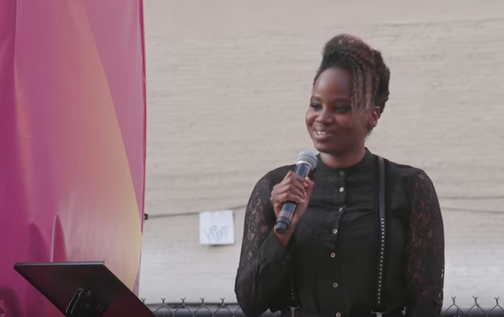Dee Rees Discusses Charlottesville, History, & Storytelling in Powerful Speech to Sundance Institute
“Our voices are all that we have,” director Dee Rees argued as she accepted the 2017 Sundance Institute Vanguard Award. They intertwine the past and present and, to use Rees’ terms, are why “the personal is the collective.” Time, history, and the power of storytelling were the main themes in the “Pariah” helmer’s moving acceptance speech, which touched upon everything from the events of Charlottesville last weekend to the dismantling of the Voting Rights Act to the groundbreaking Brown v. The Board of Education Supreme Court case.
“It has been 75 years since my grandmother’s Ferriday, Louisiana school truncated blacks’ education at 11th grade so they would not have to give them high school diplomas,” Rees revealed. “But it’s been 47 years since she earned her bachelor’s degree at Tennessee State University anyway. It has been 63 years since the Supreme Court ruled in the Brown v. The Board of Education, but it’s only been 28 years since I was bused across town to middle schools as part of an integration program in Nashville, Tennessee.”
“You see, the distance between two narratives is very elastic,” Rees emphasized, “sometimes stretching farther apart, sometimes collapsing together in the now, now, now.”
Rees cited Charlottesville, Virginia and Chief Justice Roberts’ excuse that “our country has changed” to defend weakening the Voting Rights Act as examples of the way history folds in on itself Additionally, the “Bessie” helmer also applied the elasticity of time to her own life.
“It has been 14 years since I quit my corporate life and first embarked on my career as a filmmaker. It has been 10 years since I walked through the doors of the Sundance Institute, with gratitude to Robert Redford, Michelle Satter, Rachel Chanoff for affirming that my story mattered and for empowering me to tell it,” Rees detailed. “It has been eight years since I wrapped production on my first film, ‘Pariah,’ and it has only been 392 days since I wrapped production on my latest film, ‘Mudbound.’ Yet the space between them, and the space in which they were created … feels simultaneous, feels more like an instant.”
“We know what happens next,” the director said in reference to the Trump administration’s vow to eradicate affirmative action. “Telling stories is one way to defend against next. No, to record next. No, to determine what happens next. I’m grateful to the Sundance Institute for celebrating me next, because either it’s been 14 years or it’s been 151 years. Either it’s been 52 years or it’s only been 34 hours that we come to this moment.”
Rees is an alumna of the Sundance Institute and a recipient of the Institute’s Time Warner and Annenberg Film Fellowships. The Vanguard Award honors “an emerging artist with creative independence.” Rees is the award’s sixth recipient.
Both “Pariah” and “Mudbound” premiered at the Sundance Film Festival. Netflix bought the latter, a portrait of race and poverty in the post–World War II South, for $12.5 million in Sundance 2017’s biggest deal. Rees is currently working on an untitled horror film exploring domestic life, race, sexuality, and small town America.
“Mudbound” will screen as a Gala at TIFF next month and is expected to hit Netflix later in 2017.
Watch Rees’ entire Sundance Institute Vanguard Award acceptance speech below.







